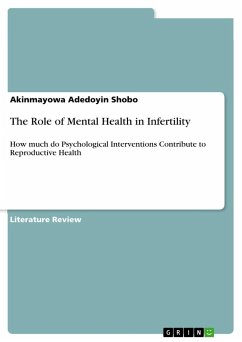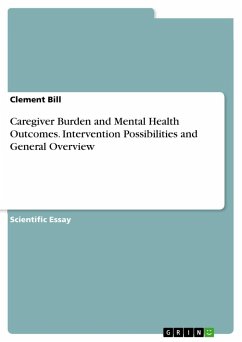Literature Review from the year 2021 in the subject Psychology - Miscellaneous, grade: A2, Obafemi Awolowo University, course: Reproduction Medicine, language: English, abstract: The subject of reproduction has, since recent history been gaining a lot of attention as there has been reports of decline in successful pregnancy rate by the World Health Organisation and other global health organisations. Healthcare professionals and researchers have attributed the root causes of the declining reproduction success to a myriad of factors including untreated mental health challenges. Globally, there has been anecdotal and empirical evidences that individuals diagnosed as infertile may also be faced by co-morbidity of mental health disorders. This arguably has been the basis of a hypothesis on a 'dyadic' nature of mental health and reproductive health.The review employed the use of psychological and medical research databases such as Google Scholar, PsycINFO, PubMed, Human Reproduction Update, Web of Science, EBSCO and the Cochrane Library. The systematic search considered open-access published papers (in English language) based on keywords such as infertility, mental health and reproductive health, infertility treatment, reproduction success rate, assisted reproduction technologies, psychological traits, psychological intervention, coping strategies among others.The study found evidences of possible association between variables of mental health (or psychotherapy) and infertility treatment outcomes including significant increases in pregnancy rate, reduction in obstetric complications among others. The researchers concluded on the need for psychotherapy as complementary or support care in infertility treatment. In spite of this, there were also evidences of no or little effect following psychological intervention and coping strategies.Wider implications: The present review also found certain limitations owing to the high level of non-homogeneity and variability across the study designs of many studies. This inevitably therefore served as a barrier to ascertaining the significant role of mental health in achieving the goals of infertility treatment programs, one of which include increasing the chances of conception while catering for the psychological burden of infertility. It is important that subsequent research incorporate the research capacities of various healthcare professionals and researchers in order to improve the quality of research on this subject.








